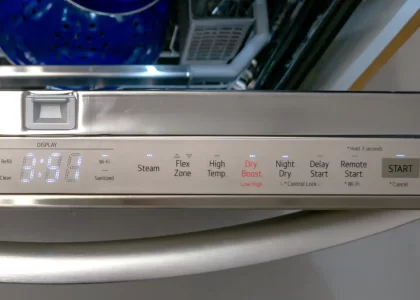Causes of Fishy Dishwasher Smells
Why does my dishwasher smell like fish? Encountering a fishy smell from a dishwasher can be both unpleasant and puzzling. Let’s dive into the common causes for this off-putting odor.
Food Particles and Residue
Often, smells stem from food remnants. These scraps stick to dishes and utensils and later decompose. Fishy smells can particularly arise from protein-rich foods, like seafood, which may cling to the dishwasher’s surfaces.
Yeast and Fungal Growth
Damp environments inside dishwashers are perfect for yeast and fungi. These organisms thrive on leftover food and moisture, leading to musty, fish-like smells.
Bacterial Buildup
Bacteria love warm, wet conditions too. As they break down organic matter, they can emit odorous byproducts. This process often results in that distinctive, unwelcome fishy smell.
Plumbing Issues
Lastly, problems with plumbing can cause odors. Blocked pipes or improper connections with garbage disposals may contribute to the issue. These scenarios may lead to waste water backing up and causing smells.
By understanding these common culprits, you’re better positioned to tackle the root of the fishy dishwasher smell issue. Keep these points in mind and continue to the next section for troubleshooting steps.
Troubleshooting Steps to Identify the Source
Why does my dishwasher smell like fish? Once you know the potential causes of a fishy dishwasher smell, the next step is to troubleshoot. Proper troubleshooting helps you identify the exact issue. Here’s how to get started.
Inspecting the Filter and Drain
Begin with the filter and drain. A clogged filter can trap food, causing smells. Remove and clean the filter thoroughly. Check the drain for blockages and clear any debris.
Checking the Spray Arms and Nozzles
Next, look at the spray arms and nozzles. If these are clogged, water can’t spray freely, leading to odor-causing buildup. Make sure the holes on the spray arms are open and clean.
Examining the Dishwasher Seal and Door
The seal and door can harbor smells too. Check the seal for food particles or mold. Clean with a gentle, non-abrasive cleaner. Wipe around the door edges to remove grime.
Investigating the Garbage Disposal Connection
Finally, inspect the link to your garbage disposal. A bad connection can cause odors to seep into the dishwasher. Ensure the disposal is clear and the hose connection is secure.
Each step is critical in pinpointing why your dishwasher might smell like fish. Address each area methodically for the best results.
Cleaning Protocols to Eliminate Odors
To get rid of the fishy smell in your dishwasher, follow a strict cleaning protocol. A regular cleaning schedule and deep cleaning methods work hand in hand.
Regular Cleaning Schedule
Set up a routine. Clean your dishwasher filter and trap every week. Wipe down the door gasket and surfaces monthly. Restart your dishwasher once a month too. This helps flush out residue that causes odors.
Deep Cleaning Techniques
Every few months, do a deep clean. Start by removing all racks and utensil holders. Clean these pieces separately. Then, clean the interior walls and door. Focus on the corners and the area around the seal.
Using Vinegar and Baking Soda
Natural cleaners like vinegar and baking soda are safe and effective. Pour a cup of white vinegar into a dishwasher-safe bowl. Place it on the top rack and run a hot cycle. Afterward, sprinkle a cup of baking soda across the bottom. Run a short, hot cycle. These two steps will help to neutralize odors.
Commercial Cleaning Products
If the smell persists, try a commercial dishwasher cleaner. Follow the instructions on the label. Remember, some products are used in an empty dishwasher. Choose those designed to combat odors.
By combining these methods, you can say goodbye to that mysterious fishy smell. Keep up the good work, and your dishwasher will stay fresh and clean.
Preventative Measures for Keeping Your Dishwasher Smell-Free
Taking proactive steps can keep your dishwasher from emitting fishy smells in the future. Prevention is key.
Rinsing Dishes Before Loading
Start by rinsing dishes well. Remove food scraps, especially seafood, before loading them. This cuts down on residue that can decay and produce odors.
Running Full Loads Only
Wait until you have a full load before running the dishwasher. This ensures maximum efficiency and less frequent usage, which in turn reduces the chance for food particles to sit and smell.
Regular Dishwasher Maintenance
Establish a maintenance routine. Clean filters, spray arms, and drains regularly. Inspect seals and fix plumbing issues promptly. This habit prevents bacteria and fungi from settling in.
Proper Loading Techniques
Load your dishwasher correctly. Place dishes in a way that allows water to circulate freely. Avoid overcrowding, which can trap food and cause smells to develop.
By implementing these preventative steps, you’re setting the stage for a consistently fresh-smelling dishwasher. Remember, routine and proper use are your best allies in the fight against odors.
When to Call a Professional
Sometimes, despite your best efforts, the fishy smell in your dishwasher lingers. If you have followed all the cleaning protocols and preventative measures but the odor remains, it might be time for professional help.
Persistent Odors After Cleaning
If the smell persists after thorough cleaning, a deeper issue could be at play. A professional can inspect your dishwasher to find hidden food buildup or other problems. They have the tools and expertise to delve into parts of the machine you might not reach.
Possible Electrical or Mechanical Issues
Foul odors can also indicate a malfunction within the dishwasher’s electrical or mechanical systems. For example, a failing heating element or pump can create a conducive environment for smells. Professionals can accurately diagnose and repair any such issues, ensuring your dishwasher operates correctly and odor-free.
Do not hesitate to contact a qualified technician if you suspect that the reason why your dishwasher smells like fish is beyond simple maintenance and cleaning. Professional intervention can save you time and prevent more significant problems in the future.
Natural Alternatives for Freshening Your Dishwasher
If you prefer natural solutions, there are several effective options to consider.
Lemon and Citrus Rinds
Lemon and other citrus rinds can work wonders. Place a few rinds in the utensil basket or directly on the top shelf. Run a normal cycle. The citrus oils are released during the wash, leaving a fresh scent.
Essential Oils
Essential oils like lavender or tea tree can neutralize fishy smells. Add a few drops to a dishwasher-safe bowl filled with water. Put it on the top rack and run a hot cycle. The steam will spread the fragrance.
DIY Non-Toxic Cleaners
Make your own cleaner with simple ingredients. Mix baking soda, vinegar, and a few drops of your favorite essential oil. Sprinkle the mixture at the bottom of the dishwasher. Run a hot cycle for a chemical-free clean.
Conclusion and Final Tips
Summary of Key Points
We’ve explored how food particles and residue can lead to fishy odors in your dishwasher. Yeast, fungi, and bacteria build-up contribute to the smell as well. Plumbing issues might also add to the problem. Identifying the problem involves inspecting the filter, spray arms, dishwasher seal, and garbage disposal. Clean regularly and deeply with natural agents like vinegar and baking soda or use commercial products.
Remember, prevention is critical. Rinse dishes to remove food scraps. Run the dishwasher only when full to prevent residue buildup. Keep up with regular maintenance. Properly load it to allow water circulation. If these steps don’t help, call in a professional. They can find and fix any deep-seated or mechanical issues.
Natural fresheners like lemon rinds, essential oils, and DIY non-toxic cleaners can keep your dishwasher smelling sweet and clean.
Ongoing Dishwasher Care
Maintain a fresh dishwasher by sticking to the routines outlined. Rinse, load correctly, and schedule regular cleans. Address small issues before they become bigger. Use natural ingredients when you can. They are safe and add freshness to your machine.
Further Resources and Advice
Why does my dishwasher smell like fish? For more detailed information, consult your dishwasher’s manual or reach out to the manufacturer. Many brands provide customized advice for maintenance. If unsure, seek help from appliance repair experts or online forums. These sources offer valuable insights into the specific question, ‘why does my dishwasher smell like fish?’ Keep learning and updating your maintenance skills to ensure your dishwasher stays odor-free.








